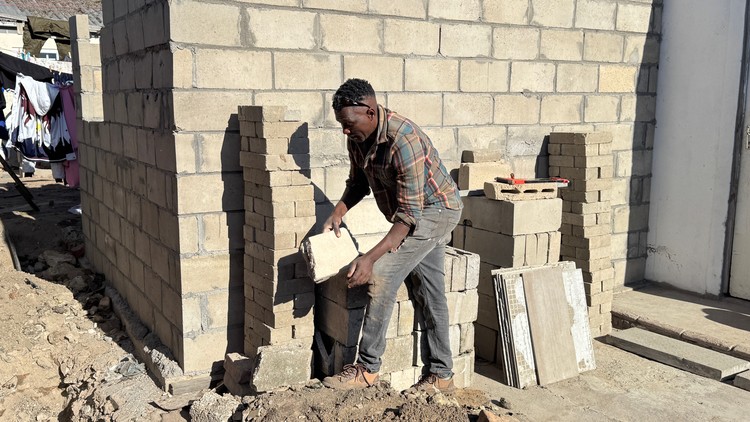
1 October 2025
Alex Kolotla is building his own house on a sports field in Dunoon. Photos: Peter Luhanga
Alex Kolotla is building his own brick-and-mortar house on City of Cape Town land in Dunoon. He says he has been on the housing waiting list since 2006.
Since 2000, no government houses have been completed in the overpopulated township.
Kolotla was among dozens of people who occupied a municipal sports field behind Sophakama Primary School. They named the settlement Ekupholeni. Their shacks were demolished several times by the City, but they later received chemical toilets and water from the municipality.
After a shack fire in 2022, Kolotla and about 40 others in the settlement started building brick-and-mortar houses. Kolotla’s house has three rooms. He designed it himself and laid the bricks by hand. He continues to build when he has money to buy materials. He plans to install a rainwater tank.
“When you have shelter, it brings dignity. I have a place I can show is my house. It comes with big value. At least I own something,” he said. “My kids are very happy with the house. They think they are in the suburbs, but they are in an informal settlement.”
Phateka Phuza is also building her own house. She has four rooms, one of which she rents out. “We are living comfortably, no shack fires. We are safe,” she said.
Phateka Phuza rents out one of the rooms in her house.
Nearly 3,000 RDP houses were built in Dunoon between 1996 and 2000. But no government housing has been built since, despite growing demand.
The Killarney Gardens housing project, launched in 2020, was intended to house 1,500 families. Bulk and internal infrastructure have been installed at a cost of R39.2-million, but the project has been paused since 2024 due to funding constraints. The Western Cape Government is handing over the project to the City of Cape Town, said department spokesperson Stephen Heyns.
Another project, in Annandale, is planned by the City of Cape Town. It is expected to house 2,500 families when completed, said City spokesperson Luthando Tyhalibongo.
Tyhalibongo did not respond to specific questions about the Ekupholeni informal settlement, but said that informal settlements reflect “the challenge of housing inadequacy and the resilience and innovation of the most vulnerable, who develop informal dwellings when formal markets are unaffordable.”